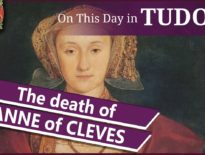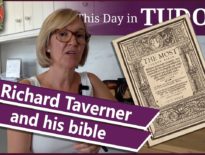On this day in Tudor history, 15th July 1556, the trial of Julins Palmer, John Gwyn and Thomas Robyns, men now known as the Newbury Martyrs, opened at St Nicholas Church in Newbury. The men were accused of sedition and heresy.
But how did Julins Palmer, a formerly staunch Catholic end up being executed for heresy in Mary I's reign?
Find out more about Palmer, his trial and the executions of the Newbury Martyrs in today's talk.
Also on this day in Tudor history, 15th July 1553, the royal ships that were supposed to be Queen Jane’s and that were guarding the coast off East Anglia to stop Mary fleeing England or any of her supporters invading England, swapped sides and declared for Queen Mary. Find out what happened in last year’s video:
Also on this day in history:
- 1497 – Birth of William Neville, poet. He was the son of Richard Neville, 2nd Baron Latimer, and his wife, Anne (née Stafford). Neville was the author of the allegorical ‘The Castell of Pleasure’.
- 1561 – Death of William Bill, Dean of Westminster, at Westminster. He was buried in St Benedict's chapel, Westminster Abbey. Bill's other offices included Master of St Johns College, Cambridge, Vice-Chancellor of the University of Cambridge, Master of Trinity College, Cambridge, and Provost of Eton College.
- 1573 – Birth of Inigo Jones, architect and theatre designer, in London. Jones is known for his design of the Banqueting House, the Queen's House at Greenwich and his stage design work, in collaboration with Ben Jonson.
- 1597 – Death of Sir Robert Dillon, lawyer, judge, Privy Councillor and Chief Justice of Common Pleas, at Riverston, County Meath, Ireland. He was buried in the parish church at Tara.
Transcript:
On this day in Tudor history, 15th July 1556, the trial of Julins Palmer, John Gwyn and Thomas Robyns, men now known as the Newbury Martyrs, opened at St Nicholas Church in Newbury.
They were accused of sedition and heresy.
Let me tell you a bit more about Julins Palmer and what led a previously staunch Catholic to be tried for heresy in Mary I’s reign.
Julins, Julius or Joscelyn Palmer was born in around 1531/1532. He was a Coventry man and was educated at Magdalen College, Oxford, graduating BA in 1547. He went on to be elected as a fellow in 1549 and was appointed reader in logic in 1550. Two years later, however, he took a leave of absence due to accusations of writing libellous verses against the college’s president. It appears that his staunch Catholicism was the root cause. He then entered the service of Sir Francis Knollys as a tutor.
Palmer returned to his fellowship following the accession of Queen Mary I and it is then that his faith was challenged by reading John Calvin’s “Institutes”, reading Peter Martyr's “Commentary on the First Epistle to the Corinthians” and seeing the executions of the Protestant bishops, Nicholas Ridley and Hugh Latimer, two of the Oxford Martyrs. Palmer embraced the Protestant faith and left his position at Oxford to become Master of Reading Grammar School. Unfortunately, suspicions of heresy followed him to Reading and his study was searched by rivals who wanted to depose and replace him. They discovered anti-Catholic works and threatened Palmer, forcing him to leave Reading and go to his mother’s at Eynsham. However, his new faith meant that he was not welcomed by his mother, and he was arrested in Reading, having returned there to pick up his manuscripts and the pay that was owed to him.
Palmer appeared before the Mayor of Reading before being taken to Newbury, where he was arraigned with John Gwyn and Thomas Robyns, who also appears in the sources as Askew or Askin. They appeared before the consistory presided over by Dr William Jeffrey, Chancellor of Salisbury. The charges against them included denying the pope’s supremacy, believing that there were only 2 sacraments, “maintaining that the priest showeth up an idol at Mass” and refusing to go to mass, denying the existence of Purgatory, and being a sower of sedition. The trial continued the next day, with Palmer, who was about twenty-four years of age, stating that his writings were all consistent with the Bible and refusing to recant, even when Sir Richard Brydges, a member of the consistory, implored him to do so, saying “If thou wilt be conformable - I will give thee meat and drink and books and ten pounds yearly - I will procure thee a wife and a farm”. The men were condemned and handed over to the secular authorities. At around 5 o’clock that evening, 16th July 1556, Palmer, Gwyn and Robyns were taken to the old sandpits in Enborne Road, Newbury, to be burnt at the stake. Martyrologist John Foxe records their deaths:
“They put off their raiment and went to the stake, and kissed it; and when they were bound to the post, Palmer said, ‘Good people, pray for us that we may persevere unto the end, and for Christ his sake beware of Popish teachers, for they deceive you.’ As he spake this, a servant of one of the Bailiffs threw a fa*got at his face, that the blood gushed out in divers places. For the which fact the Sheriff broke his head, that the blood likewise ran about his ears. When, the fire was kindled and began to take hold of their bodies, they lift their hands towards heaven, and quietly and cheerfully, as though they felt no smart, they cried, ‘ Lord Jesu, strengthen us ; Lord Jesu, assist us; Lord Jesu, receive our souls.’ And so they continued, without any struggling, holding up their hands and knocking their hearts, and calling upon Jesu until they had ended their mortal lives.”



Leave a Reply